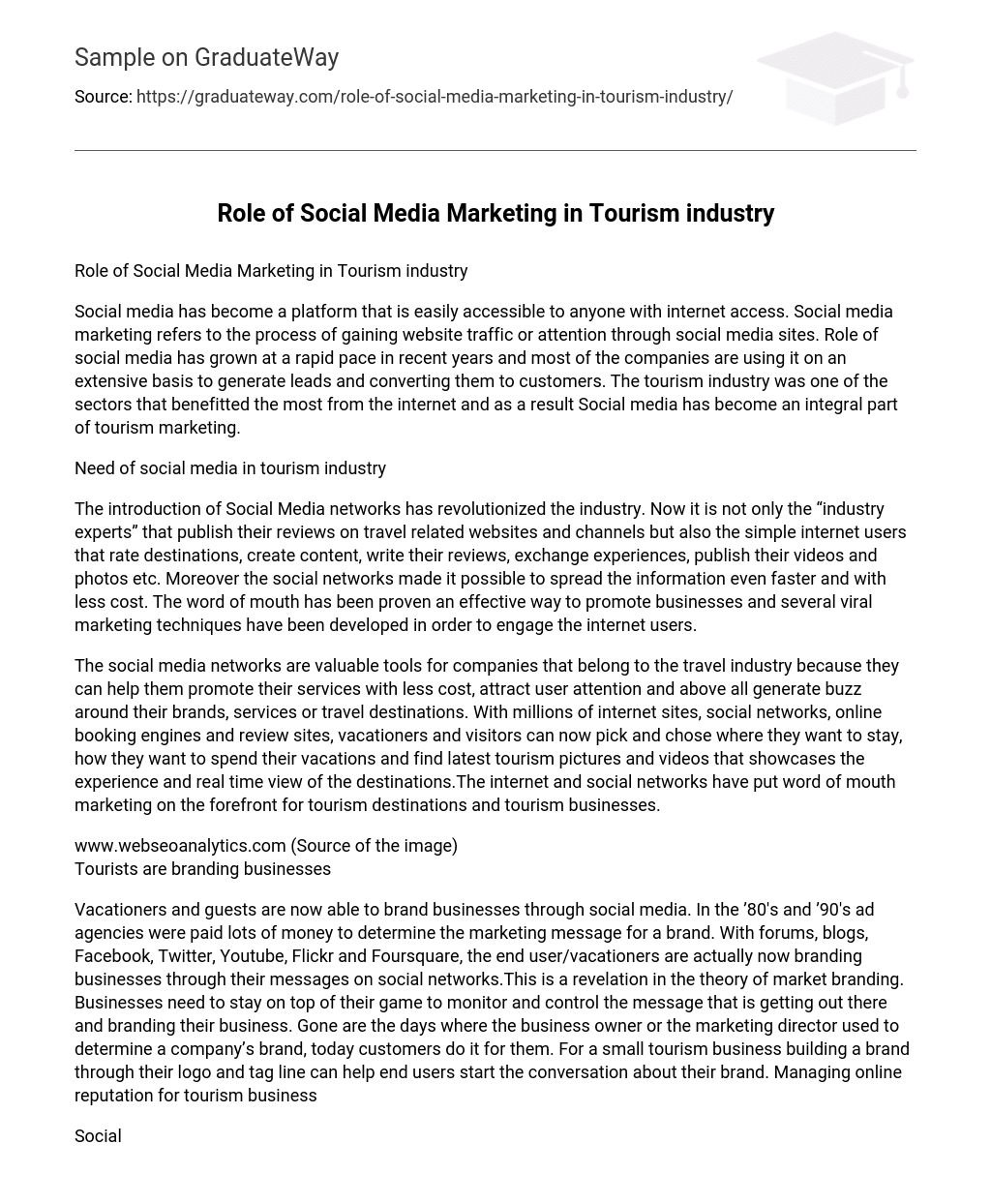Social media has emerged as a crucial marketing tool due to its widespread availability. It allows businesses to draw attention and drive website traffic through various social media platforms. Over the years, companies have significantly increased their utilization of social media, particularly for lead generation and customer conversion. The tourism sector specifically has greatly profited from this digital transformation, integrating social media as an essential component of their marketing strategy.
The tourism industry relies heavily on social media.
Social media networks have transformed the industry by allowing both experts and regular internet users to contribute to travel websites and channels. They do this by rating destinations, creating content, writing reviews, exchanging experiences, and publishing videos and photos. Moreover, social networks have made information dissemination quicker and more cost-effective. Businesses have also gained from word-of-mouth promotion through different viral marketing techniques that involve internet users.
Social media networks have become invaluable for the travel industry due to their cost-effective methods of promoting services, capturing user attention, and generating excitement around brands, services, or travel destinations. With numerous websites, social networks, online booking engines, and review platforms accessible on the internet, travelers now have the ability to make well-informed decisions about accommodations and plan their vacations based on real-time experiences shared through visually-driven tourism content such as pictures and videos. Consequently, the internet and social networks have significantly enhanced word-of-mouth marketing for businesses and destinations in the tourism sector.
www.webseoanalytics.com (Source of the image)
Tourists are promoting businesses.
The website www.webseoanalytics.com is the source of the image. The image depicts tourists promoting businesses.
The emergence of social media platforms, such as forums, blogs, Facebook, Twitter, Youtube, Flickr, and Foursquare has given power to vacationers and guests in shaping businesses’ branding strategies. In the past, ad agencies were paid large sums to establish a brand’s marketing message; however, this dynamic has shifted with the rise of social networks. Now it is the end user/vacationer who shapes businesses through their messages on these platforms. This shift represents a breakthrough in market branding and necessitates businesses being watchful in monitoring and controlling their brand image. The days where business owners or marketing directors had exclusive control over a company’s brand are long gone – today it is the customers who determine its perception. For small tourism businesses, creating a strong brand identity through their logo and tagline can encourage users to engage in discussions about their brand. Thus managing online reputation is crucial for success in the tourism industry.
Social networks provide valuable insights into a business’s performance and stakeholder perception. Regularly monitoring social networks allows businesses to assess brand image and messaging effectiveness with the target market. Platforms like Twitter, Facebook, and review sites such as TripAdvisor help companies gain customer experience understanding. Consequently, many firms assign their customer service teams to address and resolve any customer complaints in order to uphold a positive reputation. The tourism industry has experienced significant effects from social media.
Social Media has revolutionized the marketing of vacation packages for tourism businesses. The days of relying on travel agents and word of mouth are long gone. Nowadays, social media allows travelers to explore and get a feel for destinations even before they set foot there, empowering them to make well-informed decisions about their vacations. This sends a clear message to travel companies: “Adapt and rethink how you utilize your social networks to attract, engage, and convert new customers into paying guests at your tourism destination and business.” Currently, when planning a trip, people frequently visit popular websites where they read numerous reviews on hotels, airlines, resorts, and more in order to make optimal choices. A prime example of such a site is TripAdvisor.com which aids customers in gathering travel information, sharing reviews and opinions on travel-related content while also participating in interactive travel forums. This underscores the significance of innovative social media strategies for the tourism industry.
Makemytrip has unveiled a social application named Tripalong. This app enables travelers to connect with their friends while on their journeys. By inputting their flight details into Tripalong, users will receive notifications if their plans coincide with those of their Facebook or LinkedIn friends. In order to maximize Return on Conversation (ROC), companies are now merging traditional marketing tactics with social media strategies while also addressing the legal, compliance, and ethical challenges of social media through careful planning. It has become apparent to all firms in the tourism industry that social media marketing efforts should complement search engine marketing and paid advertising as methods of promotion. The utilization of social media strategy has assisted companies in the tourism sector in various ways, including enhancing brand and location awareness.
2. Safeguarding their online image
3. Cultivating enduring and impactful communities that generate online advocates and trendsetters through word of mouth marketing.
4. Establishing a customer service platform
5. Facilitating research and development
6. Propelling conversions and sales
Every company is allocating more money to their social media marketing budget because they recognize its effectiveness in boosting their website’s popularity. Additionally, it enables them to achieve impressive outcomes while keeping costs low. Moreover, this method of marketing complements any other advertising campaign.





